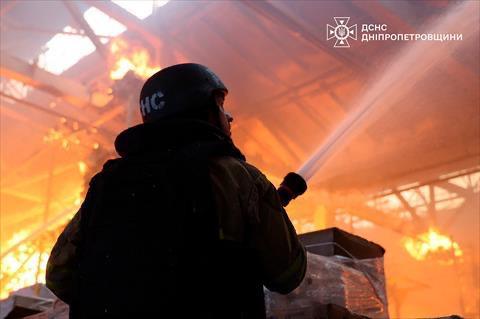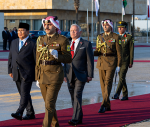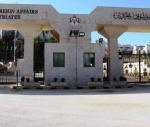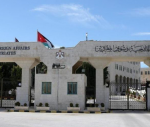You are here
Europe holds fresh 'coalition of willing' talks on Ukraine
By AFP - Apr 10,2025 - Last updated at Apr 10,2025

In this handout photograph taken and released by the Ukrainian Emergency Service on April 10, 2025, a Ukrainian rescuer works to extinguish a fire at the site of a Russian missile strike in Dnipro (AFP photo)
BRUSSELS, Belgium — European defence ministers held fresh talks Thursday on the potential deployment of troops to secure any Ukraine ceasefire, but there were more questions than answers as US peace efforts with Russia stall.
Britain and France are spearheading discussions among a "coalition of the willing" of 30 countries looking to shore up any deal US President Donald Trump might strike.
"Our planning is real and substantial. Our plans are well developed," UK defence minister John Healey told the meeting at NATO headquarters in Brussels.
"Our reassurance force for Ukraine would be a committed and credible security arrangement to ensure that any negotiated peace does bring what President Trump has pledged, a lasting peace for Ukraine."
Healey said he did not envisage "a peacekeeping force that will separate the currently warring sides down the line of contact". Bolstering Ukraine's battered forces would be a key part of the plans, he added.
France's Sebastian Lecornu echoed his British counterpart, saying "the first guarantee of security is obviously support for the Ukrainian army, which means refusing to demilitarise Ukraine, as Russia is demanding".
‘What is the mandate?'
London and Paris insist progress has been made at repeated rounds of talks -- and military planners will now step up work on how to secure any peace in the skies, at sea and on land.
But ministers from other countries said there was still uncertainty over the aims of any possible deployment -- and whether it would be backed up by US military might.
"What is the potential mission, what is going to be the goal?" asked Dutch Defence Minister Ruben Brekelmans.
"What is the mandate? What would do we do in the different scenarios, for example, if there would be any escalation regarding Russia?" he added.
"It's very important to have the United States on board, but then it also needs to be clear what type of mission it is and what we ask from the United States."
European officials say so far some six countries -- including Britain, France, and the Baltic states -- have said they could contribute troops.
Swedish minister Pal Jonson said Stockholm had "a number of questions that we need to get clarified" before making any commitments.
"It's helpful if there's a clarity of what that mission would entail, and what do we do -- if we are peacekeeping, deterrence or reassurance," he said.
A major problem for European allies as they scramble to come up with any plan is that they are largely in the dark about US efforts with Russia to halt the fighting.
Trump's administration has held several rounds of talks with both Ukrainian and Russian officials hoping to secure a halt in fighting, without seeing any tangible results.
The two sides in principle agreed to stop targeting energy infrastructure but they never cemented the conditions and strikes have continued.
Russia so far has said it would not accept troops any NATO countries be stationed on Ukrainian soil as part of a peace deal.















